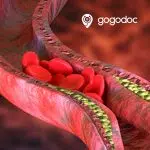What is Dizziness?
- Dizziness is the feeling of being lightheaded, woozy, or unbalanced. It affects the sensory organs, specifically the eyes and ears, so it can sometimes cause fainting. Dizziness isn’t a disease, but rather a symptom of various disorders.
- It may also feel like motion sickness or as if you’re leaning to one side. Disequilibrium is a loss of balance or equilibrium. True dizziness is the feeling of lightheadedness or nearly fainting.
- Dizziness is common and its underlying cause usually isn’t serious. Occasional dizziness is not something to worry about. However, you should call your doctor immediately if you’re experiencing repeated episodes of dizziness for no apparent reason or for a prolonged period.
Causes of dizziness:
- Common causes of dizziness include a migraine, medications, and alcohol. It can also be caused by a problem in the inner ear, where balance is regulated.
- Dizziness is often a result of vertigo as well. The most common cause of vertigo and vertigo-related dizziness is benign positional vertigo (BPV). This causes short-term dizziness when someone changes positions quickly, such as sitting up in bed after lying down.
Some other possible causes of dizziness include:
- Sudden drop in blood pressure
- Heart muscle disease
- Decrease in blood volume
- Anxiety disorders
- Anemia (low iron)
- Hypoglycemia (low blood sugar)
- Ear infection
- Dehydration
- Heat stroke
- Excessive exercise
- Motion sickness
In rare cases, dizziness could be caused by multiple sclerosis, a stroke, a malignant tumor, or another brain disorder.
Symptoms of dizziness:
People experiencing dizziness may feel various sensations, including:
- Lightheadedness or feeling faint
- A false sense of spinning
- Unsteadiness
- Loss of balance
- Feeling of floating or swimming
Sometimes, dizziness is accompanied by nausea, vomiting, or fainting. Seek emergency medical help if you have these symptoms for extended periods.
Treatments for dizziness:
Treatment for dizziness focuses on the underlying cause. In most cases, home remedies and medical treatments can control the cause of dizziness. For example:
- Inner-ear issues may be managed with medications and at-home exercises that can help control balance.
- BPV can be resolved with maneuvers that can help alleviate symptoms. Surgery is an option for patients whose BPV is not otherwise controlled.
- Meniere’s disease is treated with a healthful low-salt diet, occasional injections, or ear surgery.
- Migraines are treated with medications and lifestyle changes, such as learning to identify and avoid migraine triggers.
- Medication and anxiety-reducing techniques can help with anxiety disorders.
- Drinking plenty of fluids can help when dizziness is caused by excessive exercise, heat, or dehydration.
Ask Gogodoc About’ is an educational series providing information on various symptoms, pains, and disorders. (*intended for educational purposes only. If you are experiencing symptoms, please reach out to book an online GP consultation with a Gogodoc GP.) Talk to a doctor online at a time that suits you from home with a phone or video appointment. You can easily book an appointment with GP.
Book a video consultation today! and get expert advice.



